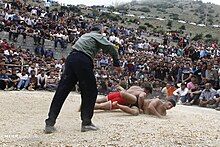Wrestling in Iran

Iranian wrestling or Koshti (Persian: کشتی, romanized: koshti) is a martial art and combat sport that has been practiced since ancient times in Iran. A form today is koshti pahlavani practiced in the zurkhaneh.[1]
While regional variations differ from one province to another. Olympic freestyle wrestling is often referred to as the "first sport" of Iran. Women's wrestling is less popular in Iran and Iranian women wrestlers have international and domestic records and honors.[1] Iran has won 47 Olympic medals for wrestling.[1]
In Iran, women's wrestling is banned unless athletes wear the hijab, restricting their ability to participate in international competitions sanctioned by United World Wrestling. This regulation has led to significant challenges for female wrestlers, who often face barriers to competing and showcasing their talents on a global stage.
Melika Balali is an Iranian-born Scottish wrestler and a gold medalist in the British Championship. In July 2022, after winning the British freestyle wrestling title, Balali protested Iran's compulsory hijab law by holding a sign that read, "Stop forcing hijab, I have the right to be a wrestler".[2]
Following this protest, she received death threats in June 2022, prompting Police Scotland to implement security measures for her.[3][4][5]
History
[edit]
Wrestling in Iran, like weightlifting, can be traced to the ancient Persian sport of Varzesh-e-Bastani,[6] which translates to "ancient sport."[1]
This practice has survived into the modern era through various attempts to downplay the pre-Islamic roots of the country. It made the transition from the Pahlavi shah's efforts to modernise the country and through the transition of the 1979 revolution.[1]
Interactions with the U.S.
[edit]After the election of Mohammad Khatami as president in 1997, he considered wrestling as a possible way to reopen diplomatic relations between Iran and U.S., after nearly two decades. This was an Iranian take on Nixon-era "ping pong" diplomacy with China.[7]
In Feb. 2017 Iran planned on denying visas to U.S. wrestlers for the Freestyle World Cup. This was done in response to President Trump's travel ban to seven Muslim majority countries. The decision to bar U.S. participants was eventually overturned by Iranian officials after a U.S. federal judge temporarily blocked Trump's ban on Iranians traveling to the U.S.[8]
Professional wrestling
[edit]| Part of a series on |
| Professional wrestling |
|---|
 |
One professional wrestling promotion that operates in Iran is the Iran Wrestling Group (IWG). The promotion was founded in 2009. They have run shows including "IWG First War" and "IWG Lord of the Ring."[9]
Professional wrestler Hossein Khosrow Ali Vaziri, originally from Damghan, Iran, may have been born on March 14, 1942, but celebrated his birthday on September 9.[10]
Women's wrestling
[edit]
After the 1979 revolution, Iranian women's wrestling, although faced with limitations, was able to achieve domestic and international achievements. However, it has more financial problems than men's wrestling.[11][12]
Notable styles of Iranian wrestling
[edit]Wrestling is the first sport in Iran and Iranians have the highest Olympic medal for wrestling.[13] in Iran two notable styles are for wrestling:
- Koshti Pahlavani, literally "heroic wrestling" (practiced throughout Iran)
- Tourkamani style or Kurash (Golestan province)
See also
[edit]References
[edit]- ^ a b c d e Fisher, Max (2012-08-09). "The Ancient Roots of Iran's Wrestling and Weightlifting Olympic Dominance". The Atlantic. Retrieved 2019-05-10.
- ^ "I Learned Freedom in the UK': Iranian-Born Wrestler Melika Balali on Taking a Stand Against Forced Hijab".
- ^ "ملیکا بلالی: اگر از زنان کشورم دفاع نمیکردم، شاید به المپیک میرفتم". Iranwire.
- ^ "Champion wrestler has police protection after threats from Iran".
- ^ "Iranian wrestler who won gold competing for Scotland says she has received death threats".
- ^ "ZOORKHANEH AND VARZESH-E-BASTANI". 5 (1). 2008-01-01: 59–73.
{{cite journal}}: Cite journal requires|journal=(help) - ^ Chehabi, H. E. (2001-03-01). "Sport diplomacy between the United States and Iran". Diplomacy & Statecraft. 12 (1): 89–106. doi:10.1080/09592290108406190. ISSN 0959-2296. S2CID 154651658.
- ^ Mostaghim, Shashank Bengali, Ramin (5 February 2017). "Iran changes its mind, says it will allow U.S. wrestlers after judge blocks Trump travel ban". Los Angeles Times. Retrieved 2019-05-10.
{{cite web}}: CS1 maint: multiple names: authors list (link) - ^ "Iran Wrestling Group (IWG) « Promotions Database « CAGEMATCH – The Internet Wrestling Database". cagematch.net. Retrieved 2019-05-10.
- ^ Greenberg, Keith Elliot (August 14, 2013). "After Addiction and Tragedy, The Iron Sheik Gets Back Up off the Mat". Bleacher Report. Archived from the original on January 28, 2022. Retrieved March 24, 2022.
- ^ "مگر دختران ایرانی هم کشتی میگیرند؟!". ایرنا (in Persian). 2021-12-29. Retrieved 2024-06-02.
- ^ "مشکلات دختر سنگین وزن کشتی ایران برای قهرمانی آسیا". ایسنا (in Persian). 2022-04-24. Retrieved 2024-06-02.
- ^ "Olympic Games: results, medals, statistics, analytics". olympanalyt.com. Retrieved 2022-09-05.
